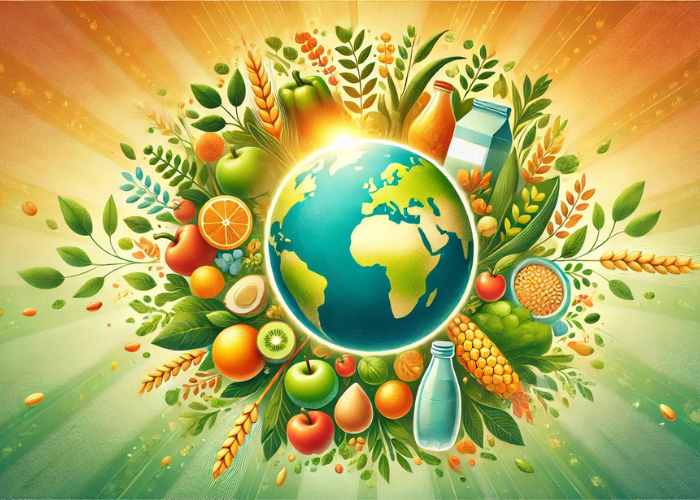Right to Foods: Food Security and Global Challenges for the FutureWORLD FOOD DAY
- 16 October 2024
- Posted by: Competere
- Categories: Empowering Consumers-HLP, highlights, News, SUSTAINABLE NUTRITION

On October 16th, World Food Day is celebrated, and this year it focuses on the theme of “Right to foods for a better life and a better future.” It serves as an opportunity to reflect on a vital issue: access to food should not be a privilege but a fundamental human right. For all living beings, food is the third essential need, following air and water. Yet, the scourge of food insecurity remains severe, affecting millions of people worldwide every day.
MALNUTRITION AND FOOD SECURITY: THE GLOBAL CHALLENGE OF THE RIGHT TO FOOD
Today, around 2.8 billion people cannot afford proper nutrition, and 733 million suffer from hunger – even though global food production exceeds the needs of the population. Access to a healthy, balanced diet is crucial for health: poor nutrition is the leading cause of malnutrition, which takes many forms, from undernourishment to obesity. Food security means not only having enough food without physical or economic barriers but also ensuring that the food is safe and nutritious. A balanced and diverse diet provides the energy needed to live a healthy and active life.
The most vulnerable people, often forced to rely on basic or cheap, unhealthy foods, have limited access to fresh and varied options. Over 1.6 billion women and children worldwide are at risk of vitamin and mineral deficiencies. Hunger and malnutrition are further worsened by crises driven by armed conflicts, extreme weather events, and economic shocks. Agri-food systems, already vulnerable to climate change, also contribute to pollution and the degradation of natural resources, with serious public health consequences: each year, 600 million people fall ill, and 420,000 die from consuming contaminated food.
ITALY’S FOOD CRISIS: THE CHALLENGE OF ACCESS TO HEALTHY FOOD
Italy is not immune to these problems. In 2022, 3.4 million Italians faced severe or moderate food insecurity, with a concerning increase in severe food insecurity from 2019 to 2021 (+0.8%). At the same time, 32.5% of the population was overweight between 2020 and 2021, with a higher prevalence among men, while 19.9% of adults suffered from obesity (FAO 2023).
In Italy, the issue is not so much the scarcity of food resources but rather the economic access to a healthy and balanced diet. In the past 12 months, the absolute poverty rate rose from 7.7% to 8.5%, affecting 5.7 million people. In 2022, 7.5% of Italians could not afford a protein-rich meal every two days, while 15.5% of those at risk of poverty could not afford an adequate meal (EUROSTAT).
But what are the most consumed foods in Italy? Cereals and their derivatives top the list, with an average daily consumption of 197g, followed by fruit (166g/day), vegetables (147g/day), and legumes (9g/day), all of which are below recommended amounts for a healthy diet. Meat consumption is around 100g per day, while fish is only 33g. The average daily energy intake is 1933 kcal, comprising 15% protein, 42% carbohydrates, and 34% fats (CREA Research Center).
LOOKING AHEAD: INNOVATION TO FEED 9.7 BILLION PEOPLE
The future of food insecurity is alarming: by 2050, the global population is projected to reach 9.7 billion, further increasing the demand for food. Ensuring food security will require boosting agricultural productivity while protecting the environment. The key lies in innovation. Cutting-edge technologies, such as regenerative livestock farming – an innovative approach that integrates ecological, managerial, and technological principles to create sustainable farming systems – will be critical in creating sustainable agriculture. New genomic techniques (NGTs) offer advanced solutions by genetically enhancing crops to be more sustainable and resilient, reducing the need for pesticides and chemical fertilizers. Many innovative technologies could therefore make a significant impact in combating food insecurity and ensuring access to healthy nutrition.
At the same time, immediate tax relief measures are necessary to support innovative businesses, helping to reduce production costs of food products that remain inaccessible for many. Policies directly benefiting consumers, such as the suspension of VAT on essential foods for a balanced diet – like extra virgin olive oil – could also help improve food accessibility.
With greater awareness, we can recognize that this day is not just about fighting hunger but also about committing to food quality, environmental sustainability, and the collective responsibility to ensure that everyone has access to proper nutrition.
Read Food waste and losses: over a billion meals thrown away every day
